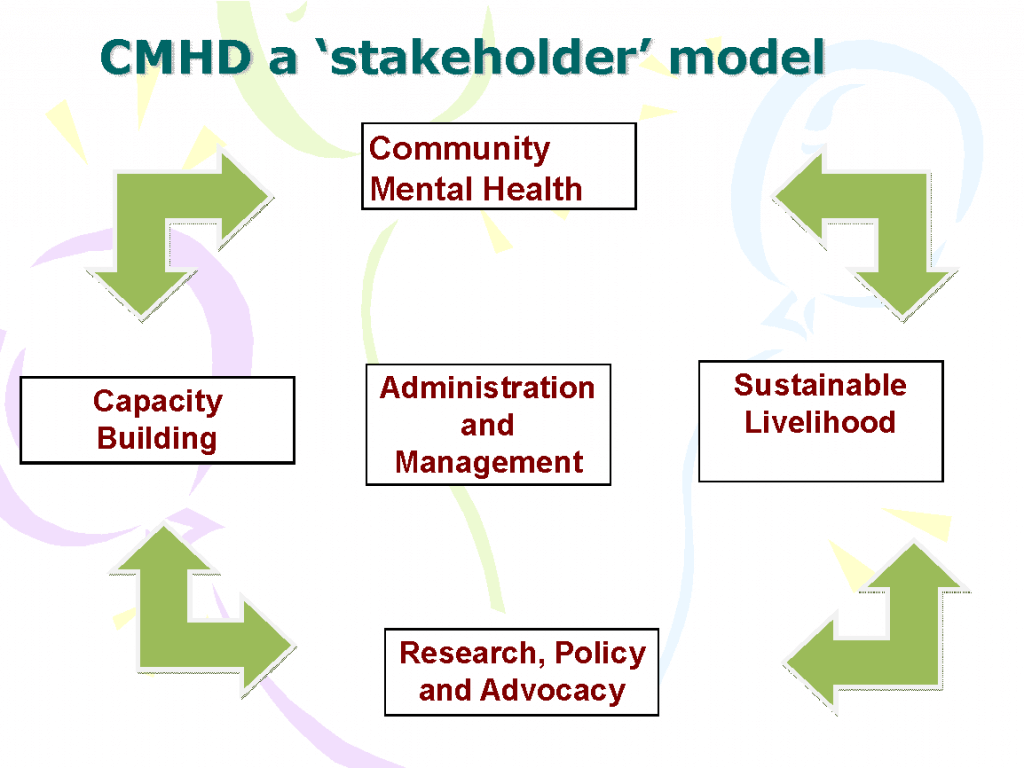Approach
Process of Implementation
Working in partnership with community development organizations, BNI facilitates appropriate orientation and capacity building process with different stakeholders groups. Field level support is provided regularly to ensure effective implementation. As the program matures, the stakeholder groups are actively involved in addressing their entitlements and rights issues with the public provider system and in the community. The programme is monitored regularly through periodic visits, reviews and documentation process.
BNI is a mental health organization with emphasis on rights and development approaches. The consultation with affected people and family members resulted in a comprehensive strategy in addressing mental health, economic empowerment, social inclusion and human rights violation within their own communities and research in relevant areas to advocate for their own entitlements and rights. The strategy is Community Mental Health and Development approach.
The approach has five components :

Community mental health
Brings easy to access and cost effective treatment to people with mental illness, especially form the Government system. Thus assist them in experiencing and acting upon their full potential as human beings in their own communities.
With the assistance of professionals and BNI staff, partner organizations receive training to design and implement care programmes in the community. People living with mental illnesses attend camps and OPDs to receive treatment. Community-based follow-up processes are set up. These include individual home visits and family group meetings and community meetings.
Local Government doctors are trained in basic psychiatry so that services are available.
Self-help/support Groups comprising people living with mental illness and carers are formed and trained.
Capacity building
BNI builds capabilities among a range of people – people living with mental illness, family members, carers, BNI staff members, partner staff members, health personnel and SHG & DPO members. Communities, faith healers, members of local governance and related government authorities are sensitized to deliver a comprehensive support to the lives of persons with mental illness by adequately addressing mental health issues in various spheres.
Staff members of partner organizations are continuously trained and supported in CMHD model. The training equips them with skills to bring affected people together and to address issues both within and outside communities.
Sustainable livelihood
BNI believes that poverty and social inequality have direct and indirect effects on the outcome and cause of mental illness. Thus, involving people living with mental illness and family members in economically viable activities is a crucial step. The programme addresses the central issues of sustainable livelihoods and poverty alleviation.
Ensuring gainful occupation is an essential part of a process that enhances confidence and facilitates integration into family, community and society. Economic development programmes suitable for the individual and family members are designed. Partners are trained in identifying local resources and economic opportunities.
Necessary links are made with micro finance organizations/groups and with locally based employment schees run by the government enables persons with mental illness and their family members to get involved in economically viable activities, including returning to their earlier occupations.
Research, policy and advocacy
Life stories/case histories and other relevant empirical data are documented. These provide the basis for significant insights that influence the programmes and are shared with other organizations. Partners track the changes in individual persons with mental illness. Factors influencing changes are recorded and made use of for people’s benefit.
Advocacy work involves ensuring the implementation of existing government policies, influencing formation new policies and enabling people to directly access government facilities. It involves generating data and evidences from programs and ‘voices of people‘ and using them as the basis for influencing change in policies and for advocacy work. Partner organizations are trained in all these aspects.
Administration and management
BNI has developed systems in the organization to ensure the quality of programs and optimum utilization of resources.Partners are assisted in the areas of Project Management that includes Finance, Monitoring, Evaluation and Reporting.
These components aim to strengthen persons with mental illness and their families to be self reliant, free of stigma and to facilitate access to the public provisioning systems, namely health care and social security entitlements from the government. As the public provisioning in the area of mental health is still in a very rudimentary state of implementation, it requires urgent attention for the affected people to benefit from it fully.
BNI’s 17 years of hands on facilitation of the CMHD initiative has demonstrated that it is a very relevant, replicable and sustainable model that has produced impressive outcomes in terms of – Access to treatment of 22000 people with severe and common mental illness from poor communities, Reduction in stigma leading to their inclusion and participation in their communities and Good linkages with the government agencies in health and other sectors.
